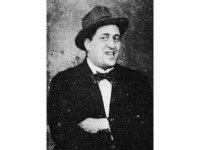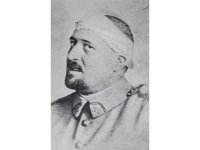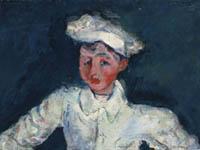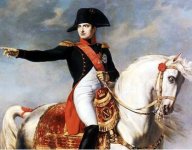Guillaume Apollinaire
 Guillaume Apollinaire (26 August 1880 – 9 November 1918) was a famous poet, playwright, short story writer, novelist and art critic.
Guillaume Apollinaire (26 August 1880 – 9 November 1918) was a famous poet, playwright, short story writer, novelist and art critic.
His real name was Wilhelm Albert Vladimir Alexander Apolinary Vonzh-Kastrawicky. His mother Angelika Kastrawickaya was born near Navahrаdak (Grodno region, Belarus).
The boy was born in Rome. He spent his childhood in Italy, studied at colleges in Monaco, Nizza, Kann. In 1899 he moved to Paris with his mother.
He formed his pen name from French variants of his names Wilhelm (Guillaume) and Apolinary (Apollinaire). Apolinary was also the name of his grandfather.
In the 1910s he was an active publicist: chronicler in the "Mercure de France", critic in "Paris-journal", in 1912-1913 he edited the magazine "Soirées de Paris" with Andre Billy. He wrote about the modern painting. Apollinaire had friendship with Pablo Picasso, Andre Derain, Francis Picabia, Maurice de Vlaminck and Henri Rousseau. In 1907 he became acquainted with the painter Marie Laurencin and until 1912 they were in love.
 Apollinaire made a manifesto of art of the future called "New spirit" at the personal request of Diaghilev and Cocteau in the spring of 1917. "New spirit" identified the development of young music France for two decades.
Apollinaire made a manifesto of art of the future called "New spirit" at the personal request of Diaghilev and Cocteau in the spring of 1917. "New spirit" identified the development of young music France for two decades.
In 1913 he finished his book "Alcools". Contemporaries noted the innovative nature of the book - lack of punctuation and others.
In the late 1910s a circle of young poets was formed around Apollinaire. They called themselves the surrealists - Andre Breton, Philippe Soupault, Louis Aragon, Jean Cocteau. The term "surrealism" belongs to Apollinaire.
He fought in the First World War and received a serious shrapnel wound to the temple in 1916.
He died of influenza during the Spanish Flu pandemic in 1918. He was buried in the Pere Lachaise Cemetery in Paris.













